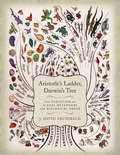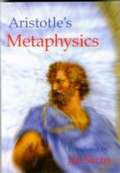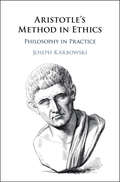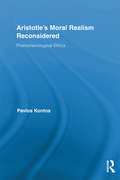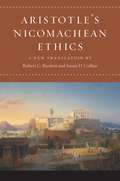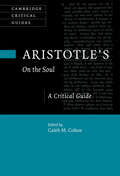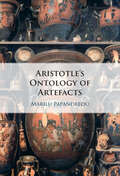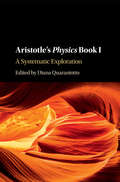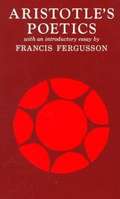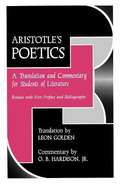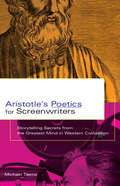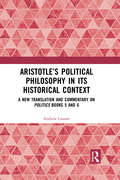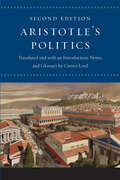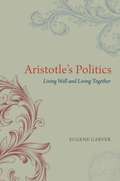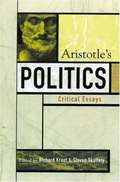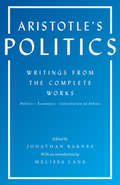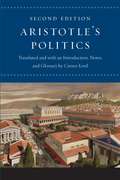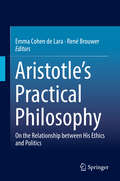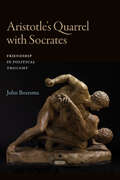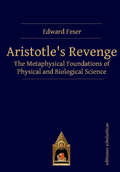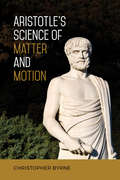- Table View
- List View
Aristotle's Ladder, Darwin's Tree: The Evolution of Visual Metaphors for Biological Order
by J. David ArchibaldLeading paleontologist J. David Archibald explores the rich history of visual metaphors for biological order from ancient times to the present and their influence on humans' perception of their place in nature, offering uncommon insight into how we went from standing on the top rung of the biological ladder to embodying just one tiny twig on the tree of life. He begins with the ancient but still misguided use of ladders to show biological order, moving then to the use of trees to represent seasonal life cycles and genealogies by the Romans. The early Christian Church then appropriated trees to represent biblical genealogies. The late eighteenth century saw the tree reclaimed to visualize relationships in the natural world, sometimes with a creationist view, but in other instances suggesting evolution. Charles Darwin's On the Origin of Species (1859) exorcised the exclusively creationist view of the "tree of life," and his ideas sparked an explosion of trees, mostly by younger acolytes in Europe. <P><P> Although Darwin's influence waned in the early twentieth century, by midcentury his ideas held sway once again in time for another and even greater explosion of tree building, generated by the development of new theories on how to assemble trees, the birth of powerful computing, and the emergence of molecular technology. Throughout Archibald's far-reaching study, and with the use of many figures, the evolution of "tree of life" iconography becomes entwined with our changing perception of the world and ourselves.
Aristotle's Metaphysics
by Aristotle Joe SachsArthur Madigan presents a clear, accurate new translation of the third book (Beta) of Aristotle's Metaphysics, together with two related chapters from the eleventh book (Kappa). Madigan's accompanying commentary gives detailed guidance to these texts, in which Aristotle sets out what he takesto be the main problems of metaphysics or 'first philosophy' and assesses possible solutions to them.
Aristotle's Method in Ethics: Philosophy in Practice
by Joseph KarbowskiThis book examines Aristotle's method in ethics from the vantage point of his broader conception of philosophy. Joseph Karbowski challenges longstanding dialectical orthodoxy and argues instead that, in his ethical treatises, Aristotle is seeking the first principles of a demonstrative ethical science, a science of human goodness, using an ethically adapted version of the method described in the second book of his Posterior Analytics. Part I of this volume develops a novel interpretation of Aristotle's conception of philosophy, which highlights its ambition to scientific knowledge (epistēmē) and its flexible approach to philosophical inquiry. Part II then demonstrates Aristotle's scientific and flexible approach to philosophy at work in his ethical treatises. The book shows how the aspiration to scientific knowledge is compatible with Aristotle's remarks about ethical precision, the practical aim of ethics, and the particular orientedness of phronēsis (practical wisdom).
Aristotle's Modal Syllogistic
by Marko MalinkAristotle was the founder not only of logic but also of modal logic. In the Prior Analytics he developed a complex system of modal syllogistic which, while influential, has been disputed since antiquity--and is today widely regarded as incoherent. In this meticulously argued new study, Marko Malink presents a major reinterpretation of Aristotle's modal syllogistic. Combining analytic rigor with keen sensitivity to historical context, he makes clear that the modal syllogistic forms a consistent, integrated system of logic, one that is closely related to other areas of Aristotle's philosophy. Aristotle's modal syllogistic differs significantly from modern modal logic. Malink considers the key to understanding the Aristotelian version to be the notion of predication discussed in the Topics--specifically, its theory of predicables (definition, genus, differentia, proprium, and accident) and the ten categories (substance, quantity, quality, and so on). The predicables introduce a distinction between essential and nonessential predication. In contrast, the categories distinguish between substantial and nonsubstantial predication. Malink builds on these insights in developing a semantics for Aristotle's modal propositions, one that verifies the ancient philosopher's claims of the validity and invalidity of modal inferences. Malink recognizes some limitations of this reconstruction, acknowledging that his proof of syllogistic consistency depends on introducing certain complexities that Aristotle could not have predicted. Nonetheless, Aristotle's Modal Syllogistic brims with bold ideas, richly supported by close readings of the Greek texts, and offers a fresh perspective on the origins of modal logic.
Aristotle's Moral Realism Reconsidered: Phenomenological Ethics (Routledge Studies in Ethics and Moral Theory)
by Pavlos KontosThis book elaborates a moral realism of phenomenological inspiration by introducing the idea that moral experience, primordially, constitutes a perceptual grasp of actions and of their solid traces in the world. The main thesis is that, before any reference to values or to criteria about good and evil—that is, before any reference to specific ethical outlooks—one should explain the very materiality of what necessarily constitutes the ‘moral world’. These claims are substantiated by means of a text- centered interpretation of Aristotle’s Nicomachean Ethics in dialogue with contemporary moral realism. The book concludes with a critique of Heidegger’s, Gadamer’s and Arendt’s approaches to Aristotle’s ethics.
Aristotle's Nicomachean Ethics
by Aristotle Robert C. Bartlett Susan D. CollinsThe Nicomachean Ethics is one of Aristotle’s most widely read and influential works. Ideas central to ethics—that happiness is the end of human endeavor, that moral virtue is formed through action and habituation, and that good action requires prudence—found their most powerful proponent in the person medieval scholars simply called “the Philosopher.” Drawing on their intimate knowledge of Aristotle’s thought, Robert C. Bartlett and Susan D. Collins have produced here an English-language translation of the Ethics that is as remarkably faithful to the original as it is graceful in its rendering. Aristotle is well known for the precision with which he chooses his words, and in this elegant translation his work has found its ideal match. Bartlett and Collins provide copious notes and a glossary providing context and further explanation for students, as well as an introduction and a substantial interpretive essay that sketch central arguments of the work and the seminal place of Aristotle’s Ethics in his political philosophy as a whole. The Nicomachean Ethics has engaged the serious interest of readers across centuries and civilizations—of peoples ancient, medieval, and modern; pagan, Christian, Muslim, and Jewish—and this new edition will take its place as the standard English-language translation.
Aristotle's Nicomachean Ethics
by Robert C. Bartlett Susan D. CollinsThe Nicomachean Ethics is one of Aristotle’s most widely read and influential works. Ideas central to ethics—that happiness is the end of human endeavor, that moral virtue is formed through action and habituation, and that good action requires prudence—found their most powerful proponent in the person medieval scholars simply called “the Philosopher. ” Drawing on their intimate knowledge of Aristotle’s thought, Robert C. Bartlett and Susan D. Collins have produced here an English-language translation of the Ethics that is as remarkably faithful to the original as it is graceful in its rendering. Aristotle is well known for the precision with which he chooses his words, and in this elegant translation his work has found its ideal match. Bartlett and Collins provide copious notes and a glossary providing context and further explanation for students, as well as an introduction and a substantial interpretive essay that sketch central arguments of the work and the seminal place of Aristotle’s Ethics in his political philosophy as a whole. The Nicomachean Ethics has engaged the serious interest of readers across centuries and civilizations—of peoples ancient, medieval, and modern; pagan, Christian, Muslim, and Jewish—and this new edition will take its place as the standard English-language translation.
'Aristotle's Nicomachean Ethics'
by Jon MillerAristotle's Nicomachean Ethics is one of the most important ethical treatises ever written, and has had a profound influence on the subsequent development of ethics and moral psychology. This collection of newly-commissioned essays, written by both senior and younger scholars in the field, presents a thorough and close examination of the work. The essays address a broad range of issues including the compositional integrity of the Ethics, the nature of desire, the value of emotions, happiness, and the virtues. The result is a volume which will challenge and advance the scholarship on the Ethics, establishing new ways of viewing and appreciating the work for all scholars of Aristotle.
Aristotle's On the Soul: A Critical Guide (Cambridge Critical Guides)
by Caleb M. CohoeAristotle's On the Soul aims to uncover the principle of life, what Aristotle calls psuchē (soul). For Aristotle, soul is the form which gives life to a body and causes all its living activities, from breathing to thinking. Aristotle develops a general account of all types of living through examining soul's causal powers. The thirteen new essays in this Critical Guide demonstrate the profound influence of Aristotle's inquiry on biology, psychology and philosophy of mind from antiquity to the present. They deepen our understanding of his key concepts, including form, reason, capacity, and activity. This volume situates Aristotle in his intellectual context and draws judiciously from his other works as well as the history of interpretation to shed light on his intricate views. It also highlights ongoing interpretive debates and Aristotle's continuing relevance. It will prove invaluable for researchers in ancient philosophy and the history of science and ideas.
Aristotle’s Physics Book I: A Systematic Exploration
by Diana QuarantottoThis book provides a comprehensive and in-depth study of Physics I, the first book of Aristotle's foundational treatise on natural philosophy. While the text has inspired a rich scholarly literature, this is the first volume devoted solely to it to have been published for many years, and it includes a new translation of the Greek text. Book I introduces Aristotle's approach to topics such as matter and form, and discusses the fundamental problems of the study of natural science, examining the theories of previous thinkers including Parmenides. Leading experts provide fresh interpretations of key passages and raise new problems. The volume will appeal to scholars and students of ancient philosophy as well as to specialists working in the fields of philosophy and the history of science.
Aristotle's Poetics: Translation and Analysis
by Aristotle S. H. Butcher Francis FergussonIntroduced by Francis Fergusson, the Poetics, written in the fourth century B.C., is still an essential study of the art of drama, indeed the most fundamental one we have. It has been used by both playwrights and theorists of many periods, and interpreted, in the course of its two thousand years of life, in various ways. The literature which has accumulated around it is, as Mr. Fergusson points out, "full of disputes so erudite that the nonspecialist can only look on in respectful silence. " But the Poetics itself is still with us, in all its suggestiveness, for the modern reader to make use of in his turn and for his own purposes. Francis Fergusson's lucid, informative, and entertaining Introduction will prove invaluable to anyone who wishes to understand and appreciate the Poetics. Using Sophocles' Oedipus Rex, as Aristotle did, to illustrate his analysis, Mr. Fergusson pints out that Aristotle did not lay down strict rules, as is often thought: "The Poetics," he says, "is much more like a cookbook than it is like a textbook of elementary engineering. " Read in this way, it is an essential guide not only to Sophoclean tragedy, but to the work of so modern a playwright as Bertolt Brecht, who considered his own "epic drama" the first non-Aristotelian form.
Aristotle's Poetics: A Translation and Commentary for Students of Literature
by Aristotle Leon Golden O. B. HardisonThis volume combines Leon Golden's highly regarded translation of Aristotle's Poetics and O. B. Hardison's detailed commentary provide a comprehensive account of the principles of the Poetics and of the critical debates they have engendered. Clearly written, highly readable, the volume was designed to meet the needs of students of literature and criticism who are not proficient in Greek, but it has become a standard reference for scholars as well as students.
Aristotle's Poetics for Screenwriters: Storytelling Secrets from the Greatest Mind in Western Civilization
by Michael TiernoAn insightful how-to guide for writing screenplays that uses Aristotle's great work as a guide.Long considered the bible for storytellers, Aristotle's Poetics is a fixture of college courses on everything from fiction writing to dramatic theory. Now Michael Tierno shows how this great work can be an invaluable resource to screenwriters or anyone interested in studying plot structure. In carefully organized chapters, Tierno breaks down the fundamentals of screenwriting, highlighting particular aspects of Aristotle's work. Then, using examples from some of the best movies ever made, he demonstrates how to apply these ancient insights to modern-day screenwriting. This user-friendly guide covers a multitude of topics, from plotting and subplotting to dialogue and dramatic unity. Writing in a highly readable, informal tone, Tierno makes Aristotle's monumental work accessible to beginners and pros alike in areas such as screenwriting, film theory, fiction, and playwriting.
Aristotle’s Political Philosophy in its Historical Context: A New Translation and Commentary on Politics Books 5 and 6
by Andrew LintottThis book offers new translations of Aristotle’s Politics 5 and 6, accompanied by an introduction and commentary, targeted at historians and those who like to read political science in the context in which it was produced. Philosophical analysis remains essential and there is no intention to detract from the books as political theory, but the focus of this volume is the text as a crucial element in the discourse of fourth-century Greece, and the conflict throughout the Greek world between democracy, oligarchy, and the rise of the Macedonian monarchy.
Aristotle's Politics
by AristotleThe “groundbreaking translation” of the foundational text of Western political thought, now in a revised and expanded edition (History of Political Thought).Aristotle’s masterwork is the first systematic treatise on the science of politics. Carnes Lord’s lucid translation helped raise scholarly interest in the work and has served as the standard English edition for decades. Widely regarded as the most faithful to both the original Greek and Aristotle’s distinctive style, it is also written in clear, contemporary English.This new edition of the Politics retains and adds to Lord’s already extensive notes, clarifying the flow of Aristotle’s argument and identifying literary and historical references. A glossary defines key terms in Aristotle’s philosophical-political vocabulary. Lord has also made revisions to problematic passages throughout the translation in order to enhance both its accuracy and its readability. He has also substantially revised his introduction for the new edition, presenting an account of Aristotle’s life in relation to political events of his time; the character and history of his writings and of the Politics in particular; his overall conception of political science; and his impact on subsequent political thought from antiquity to the present. Further enhancing this new edition is an up-to-date selected bibliography.
Aristotle's Politics: Living Well and Living Together
by Eugene Garver“Man is a political animal,” Aristotle asserts near the beginning of the Politics. In this novel reading of one of the foundational texts of political philosophy, Eugene Garver traces the surprising implications of Aristotle’s claim and explores the treatise’s relevance to ongoing political concerns. Often dismissed as overly grounded in Aristotle’s specific moment in time, in fact the Politics challenges contemporary understandings of human action and allows us to better see ourselves today. Close examination of Aristotle’s treatise, Garver finds, reveals a significant, practical role for philosophy to play in politics. Philosophers present arguments about issues—such as the right and the good, justice and modes of governance, the relation between the good person and the good citizen, and the character of a good life—that politicians must then make appealing to their fellow citizens. Completing Garver’s trilogy on Aristotle’s unique vision, Aristotle’s Politics yields new ways of thinking about ethics and politics, ancient and modern.
Aristotle's Politics: Living Well and Living Together
by Eugene Garver“Man is a political animal,” Aristotle asserts near the beginning of the Politics. In this novel reading of one of the foundational texts of political philosophy, Eugene Garver traces the surprising implications of Aristotle’s claim and explores the treatise’s relevance to ongoing political concerns. Often dismissed as overly grounded in Aristotle’s specific moment in time, in fact the Politics challenges contemporary understandings of human action and allows us to better see ourselves today. Close examination of Aristotle’s treatise, Garver finds, reveals a significant, practical role for philosophy to play in politics. Philosophers present arguments about issues—such as the right and the good, justice and modes of governance, the relation between the good person and the good citizen, and the character of a good life—that politicians must then make appealing to their fellow citizens. Completing Garver’s trilogy on Aristotle’s unique vision, Aristotle’s Politics yields new ways of thinking about ethics and politics, ancient and modern.
Aristotle's Politics
by Richard Kraut Steven SkultetyAristotle's Politics is widely recognized as one of the classics of the history of political philosophy, and like every other such masterpiece, it is a work about which there is deep division. Many readers of Aristotle are uncertain whether his Politics has any contribution to make to contemporary debates about political life and political theory. The essays in this volume aim to address, implicitly or explicitly, this very question about the relevance of Arisotle's thinking in contemporary political philosophy. Written by leading scholars in lucid and accessible style, the nine essays in this volume will be a critical resource for newcomers to Aristotle.
Aristotle's Politics: Politics, Economics, Constitution of Athens
by Melissa Lane Jonathan Barnes AristotleAristotle was the first philosopher in the Western tradition to address politics systematically and empirically, and he remains a central figure in political theory. This essential volume presents Aristotle’s complete political writings—including his Politics, Economics, and Constitution of Athens—in their most authoritative translations, taken from the complete works that is universally recognized as the standard English edition. Edited by Jonathan Barnes, one of the world’s leading scholars of ancient philosophy, and with an illuminating introduction by Melissa Lane, an authority on ancient political philosophy, this compact but comprehensive volume will be invaluable for all students of politics, philosophy, classics, or Western thought.
Aristotle's Politics
by Carnes LordOne of the fundamental works of Western political thought, Aristotle's masterwork is the first systematic treatise on the science of politics. For almost three decades, Carnes Lord's justly acclaimed translation has served as the standard English edition. Widely regarded as the most faithful to both the original Greek and Aristotle's distinctive style, it is also written in clear, contemporary English. This new edition of the Politics retains and adds to Lord's already extensive notes, clarifying the flow of Aristotle's argument and identifying literary and historical references. A glossary defines key terms in Aristotle's philosophical-political vocabulary. Lord has made revisions to problematic passages throughout the translation in order to enhance both its accuracy and its readability. He has also substantially revised his introduction for the new edition, presenting an account of Aristotle's life in relation to political events of his time; the character and history of his writings and of the Politics in particular; his overall conception of political science; and his impact on subsequent political thought from antiquity to the present. Further enhancing this new edition is an up-to-date selected bibliography.
Aristotle’s Practical Philosophy: On the Relationship between His Ethics and Politics
by René Brouwer Emma Cohen de LaraThis book is the first collection of essays in English devoted solely to the relationship between Aristotle's ethics and politics. Are ethics and politics two separate spheres of action or are they unified? Those who support the unity-thesis emphasize the centrality for Aristotle of questions about the good life and the common good as the purpose of politics. Those who defend the separation-thesis stress Aristotle's sense of realism in understanding the need for political solutions to human shortcomings. But is this all there is to it? The contributors to this volume explore and develop different arguments and interpretative frameworks that help to make sense of the relationship between Aristotle's Ethics and Politics. The chapters loosely follow the order of the Nicomachean Ethics in examining topics such as political science, statesmanship and magnanimity, justice, practical wisdom, friendship, and the relationship between the active and the contemplative life. They have in common an appreciation of the relevance of Aristotle's writings, which offer the modern reader distinct philosophical perspectives on the relationship between ethics and politics.
Aristotle's Quarrel with Socrates: Friendship in Political Thought (SUNY series in Ancient Greek Philosophy)
by John BoersmaAristotle's Quarrel with Socrates is an account of the role friendship plays in ancient political thought. Examining Platonic dialogues and Aristotle's ethical and political treatises, John Boersma makes the case that the different stances Aristotle and Socrates take toward politics can be traced to their divergent accounts of friendship. Aristotle's Quarrel with Socrates brings to the fore the tension that exists between the philosophic life as exemplified by Socrates and the life devoted to politics. It goes on to argue that Aristotle's account of a friendship of the good, based on human excellence, can reduce, not to say eliminate, this tension, enabling the development of a political community that is organized for action in history.
Aristotle’s Revenge: The Metaphysical Foundations of Physical and Biological Science
by Edward FeserActuality and potentiality, substantial form and prime matter, efficient causality and teleology are among the fundamental concepts of Aristotelian philosophy of nature. Aristotle’s Revenge argues that these concepts are not only compatible with modern science, but are implicitly presupposed by modern science. Among the many topics covered are the metaphysical presuppositions of scientific method; the status of scientific realism; the metaphysics of space and time; the metaphysics of quantum mechanics; reductionism in chemistry and biology; the metaphysics of evolution; and neuroscientific reductionism. The book interacts heavily with the literature on these issues in contemporary analytic metaphysics and philosophy of science, so as to bring contemporary philosophy and science into dialogue with the Aristotelian tradition.
Aristotle's Science of Matter and Motion
by Christopher ByrneAlthough Aristotle’s contribution to biology has long been recognized, there are many philosophers and historians of science who still hold that he was the great delayer of natural science, calling him the man who held up the Scientific Revolution by two thousand years. They argue that Aristotle never considered the nature of matter as such or the changes that perceptible objects undergo simply as physical objects; he only thought about the many different, specific natures found in perceptible objects. Aristotle’s Science of Matter and Motion’s focus is on refuting this misconception, arguing that Aristotle actually offered a systematic account of matter, motion, and the basic causal powers found in all physical objects. Author, Christopher Byrne sheds lights on Aristotle’s account of matter, revealing how Aristotle maintained that all perceptible objects are ultimately made from physical matter of one kind or another, accounting for their basic common features. For Aristotle, then, matter matters a great deal.
